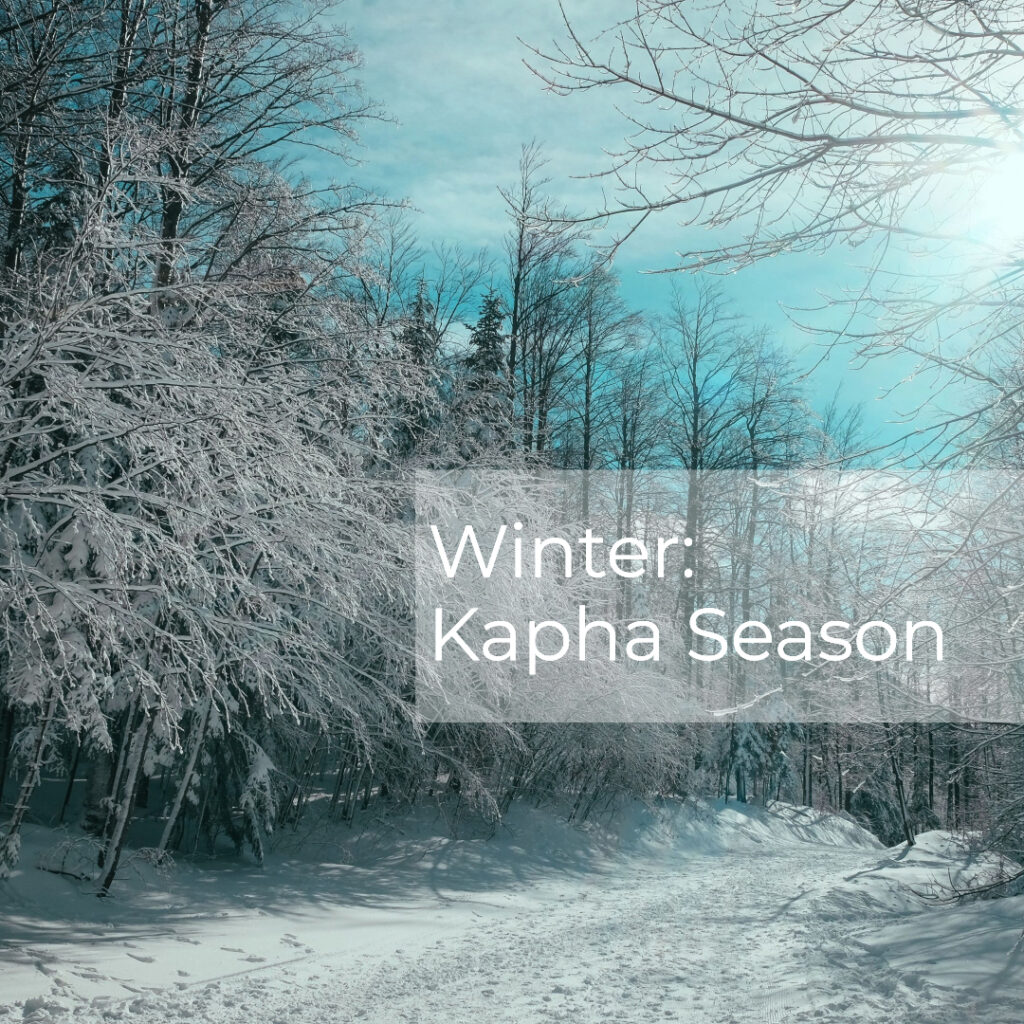
“Ayurveda recognizes winter as a kapha season with strong vata undertones. It is characterized by cold weather, a sense of heaviness, increased moisture (usually in the form of rain or snow), cloud-covered days, and the grounded, slow feeling that sends many animals into hibernation. These are all qualities shared by kapha dosha, which is why winter is considered—primarily—a kapha season.
However, if your climate is exceptionally cold and dry, or if you tend to feel more isolated during the winter months, vata will also be a strong component of your winter season, and you will want to actively keep vata placated as well.
How to Create a Supportive Winter Diet
Winter is actually the season when the digestive fire is strongest. The body requires more fuel to stay warm and healthy in the winter months, and the cold weather forces the fire principle deep into the core of the body—igniting the digestive capacity.
Our bodies, therefore, crave a more substantial, nutritive diet at this time of year, and you will likely find yourself eating larger quantities of food.
A supportive winter diet will be aimed at pacifying kapha without increasing vata or vice versa. For many, appropriate winter dietary habits actually come quite naturally.
- You’ll want to focus on eating warm, cooked, slightly oily, well-spiced foods, favoring a balance of the six tastes.
- Drink room temperature, warm, or hot beverages and avoid iced or chilled drinks, if possible. You can increase heat and circulation while encouraging clean and clear respiratory passages by drinking a tea boiled for five minutes with ½ teaspoon each of dried ginger, cinnamon, and clove.
- CCF Tea encourages strong digestion and can be taken after meals or sipped throughout the day.
- Hearty, heating vegetables like radishes, cooked spinach, onions, carrots, and other root vegetables are well-received this time of year, as are hot spices like garlic, ginger, black pepper, cayenne, and chili peppers.
- Cooked grains like oatmeal, cornmeal, barley, tapioca, rice, or kitchari make a terrific breakfast, and lunches and dinners of steamed vegetables, whole wheat breads, and mushy soups are ideal.
- Legumes are usually good for kapha, but they should be well-cooked, well-spiced, and garnished with a dollop of ghee so as not to aggravate vata.
- If you eat them, winter is also a great time to enjoy eggs (especially poached or hard-boiled) and meats like chicken, turkey, and venison.
- While dairy is best reduced in the winter months, a cup of hot, spiced milk with a pinch of turmeric or dried ginger and nutmeg before bed can help to encourage sound sleep and should not be overly congesting.
Ideal Winter Foods
The following is a list of winter foods recommended by prominent figures in the Ayurvedic community, including John Douillard and Vasant and Usha Lad:
Fruits to Favor
Apples (cooked), Apricots, Bananas. Berries, Cantaloupe, Cherries, Dates, Figs, Grapefruit, Limes, Lemons, Mangoes, Oranges, Papaya, Peaches, Prunes (soaked), Tangerines.
Vegetables to Favor
Asparagus, Beets, Brussel Sprouts, Carrots, Chilies, Corn, Eggplant, Garlic, Green Beans, Greens (cooked), Mushrooms, Leeks, Onions, Okra, Potatoes, Rutabaga, Spinach (cooked), Winter Squash, Turnips.
Grains to Favor
Amaranth, Barley, Buckwheat, Corn, Millet, Oats, Quinoa, Rice, Basmati Rice, Brown Rye, Seitan, Wheat.
Legumes to Favor
Lentils (brown and red), Miso, Mung Beans, Navy Beans,Tempeh, Tofu, Toor Dal, Urad Dal.
Nuts and Seeds to Favor
Almonds, Brazil Nuts, Cashews, Hazelnuts, Macadamia Nuts, Peanuts, Pecans, Pine Nuts, Pistachios, Walnuts, Pumpkin Seeds, Sunflower Seeds.
Dairy to Favor
Butter, Soft Cheeses, Cottage Chees, Cow’s Milk (not cold), Goat’s Milk (not cold), Sour Cream.
Animal Products to Favor (If You Eat Them)
Poultry, Eggs, Freshwater Fish, Shrimp, Venison.
Oils to Favor
Almond Oil, Corn Oil, Flax Seed Oil, Ghee, Mustard Oil, Olive Oil, Safflower Oil, Sesame Oil, Sunflower Oil.
Sweeteners
Honey, Jaggary, Molasses.
Spices to Favor
- All spices can be supportive during the winter months.”
Source: https://www.banyanbotanicals.com/info/ayurvedic-living/living-ayurveda/seasonal-guides/winter-guide/
